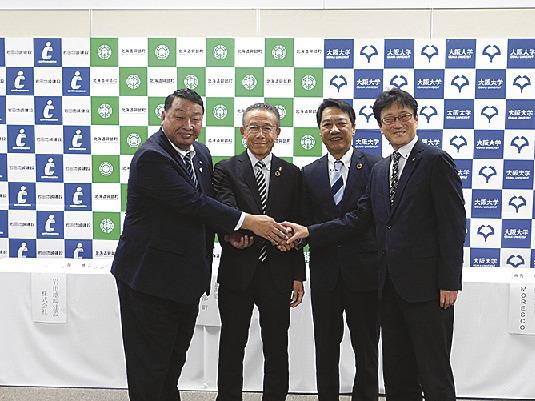Iwata Jizaki Construction Co., Ltd. announced on the 25th that it will start the Okobbe Carbon Neutral Innovation Project, which will produce formic acid and methanol from biogas derived from livestock manure. Joint venture with chemical manufacturer MORESCO, Osaka University and Okopbe Town, Hokkaido. Based on the world's first methane oxidation technology developed by Osaka University, we have developed a pilot-scale equipment capable of producing 10 tons of formic acid by 2025, and have established a Dairy farms circulate production and consumption locally, establishing a domestic distribution network. and out of town. Aim to build a system.

Vice President Hiroyuki Seki (second from left) and others pledged to cooperate in building a circular dairy farming system
In 2018, a research team led by Professor Takashi Okubo of Osaka University discovered a technology to dissolve chlorine dioxide and methane gas in a special solution and convert it into liquid fuel methanol and formic acid at temperatures and room pressure. In 2019, Osaka University and Okopbe Town signed a cooperation agreement to jointly develop technology to convert biogas produced from livestock manure into liquid fuel.
In 2020, for the first time in the world, he successfully produced methanol and formic acid from methane gas. In 2021, together with Iwata Chisaki Construction and other companies, we built a pilot plant to commercialize this technology as part of the main research program of the Industrial Technology Development Organization and New Energy (NEDO), and is conducting research on improving reaction efficiency and scaling up. I have made progress.
This project aims to develop equipment to continuously produce methanol and formic acid from methane gas, and build a formic acid supply chain within and outside the town. In May, the four parties formed a consortium called OCNIC, with Iwata Jizaki Construction as representative. The project will begin after being selected to participate in the "Zero Carbon Innovation Introduction Support Project" publicly called for by Hokkaido.
The estimated cost of the project is about 300 million yen over three years. During fiscal year 2015, we will build and operate a bench scale that can produce 1 ton of formic acid per year. In fiscal 2014, we will conduct verification to improve production efficiency and scale up, and in fiscal 2015, we will be able to produce 10 tons of formic acid per year. Develop pilot-scale equipment. At the same time, we will conduct market research to evaluate the quality and distribution of bioformic acid produced.
MORESCO and Osaka University will develop a bioformic acid production and concentration plant, while Iwata Jizaki Construction Co. and Okopbe Town will jointly conduct market research and usage review to evaluate bioformic acid and build supply chains.
Formic acid is mainly used as an additive in the production of silage as feed for dairy cows. About 10,000 tons are used annually in Japan and most are imported. Additionally, because it is a petroleum-based chemical, carbon dioxide (CO2) is emitted during the production process and prices are increasing due to recent increases in crude oil prices.
The press conference on the 25th was attended by Hiroyuki Seki, Representative Director and Vice President of Iwata Chisaki Construction Company, Okibu Town Mayor Kazuhisa Okubo, Professor Okubo and MORESCO President Motohisa Morozumi. Vice President Seki said: ``Building a recycling-oriented dairy farming system can greatly contribute to carbon neutrality by promoting local production and consumption of dairy ingredients. as well as reduce greenhouse gases.'' Once the project is completed, the company aims to deploy it across Hokkaido by fiscal 2030, claiming: “After being deployed across Hokkaido, sales Bioformic acid is expected to bring economic benefits of 10 billion yen and reduce greenhouse gas emissions by 2.73 million tons per year,” emphasizing the importance of the project.






